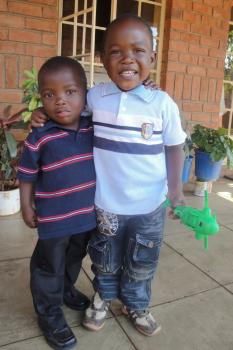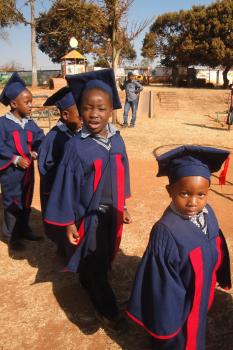Poverty, famine and HIV/AIDS endanger lives in Lilongwe

Malawi’s capital Lilongwe has a population of over 780,000.
Poverty levels remain high in the city and living conditions are extremely harsh. The local community is malnourished to a great extent. Many families do not have enough food and parents, especially single mothers, often go without eating for several days at a time – what little food is available goes to the children. But if parents are weakened by malnutrition, it can mean that they are no longer able to do household chores and care for their children. Especially when a child has a disability, parents are often unable to ensure the treatment and attention the child needs.
Many malnourished people in the region are severely poverty-stricken: they live in shacks made from scraps of wood and plastic, lacking proper sanitation. They drink untreated water from unprotected sources, and their immunity against common diseases such as colds, diarrhoea and common childhood illnesses is greatly reduced. These diseases are also common when a person is HIV positive.
Efforts to combat HIV/AIDS in the country have been intensified in recent years. Nevertheless, in urban areas – especially in the capital – prevalence rates are as high as 17 per cent; well above the national average of eleven per cent. 60 per cent of those infected are female, and the majority of HIV infections occur amongst young people between the ages of 13 and 24.
For children, these conditions seriously endanger their future. Efforts to ensure health, education, a nutritious diet and a secure home for every child are urgently needed.
SOS Social Centres – supporting all members of the community
The first SOS Children's Village in Malawi was established in the capital Lilongwe in 1994. In recent years, we have continuously expanded our family strengthening programme in the region so as to reach as many struggling families as possible. It is our aim to alleviate hardship and maintain family stability so that children will be safe and protected and grow up in a loving home.
What we do in Lilongwe

Support families: The SOS Social Centre in Lilongwe supports around 2,000 people, ensuring that children have access to essential health and nutritional services, as well as education. We assist parents by providing guidance on income-generating skills and parenting practices, as well as counselling and psychological support where needed. In cooperation with local organisations, we work towards strengthening the support systems for vulnerable families within the community. Above all, our support goes out to families affected by HIV/AIDS.
Care in SOS families: For children from the region who are no longer able to live with their parents, SOS families can provide a loving home for up to 120 children. In each family, the children live with their brothers and sisters, affectionately cared for by their SOS mother.
Education: The children attend the SOS Kindergarten together with children from the neighbourhood, which ensures that they are integrated into the local community from a young age. The children then go on to complete their primary and secondary education at the SOS schools, which are attended by almost 1,200 pupils. We also run an SOS Vocational Training Centre here in Lilongwe, which offers courses in agricultural production and processing, business, IT, secretarial training, carpentry, tailoring, metalwork and plumbing. The skills and certifications acquired should enable students to generate an income and provide for themselves.
Support for young people: When young people who grew up in an SOS family feel ready to move out of the family home in order to pursue further education or vocational training, our SOS Youth Programme continues to support them as they make the transition into adulthood.